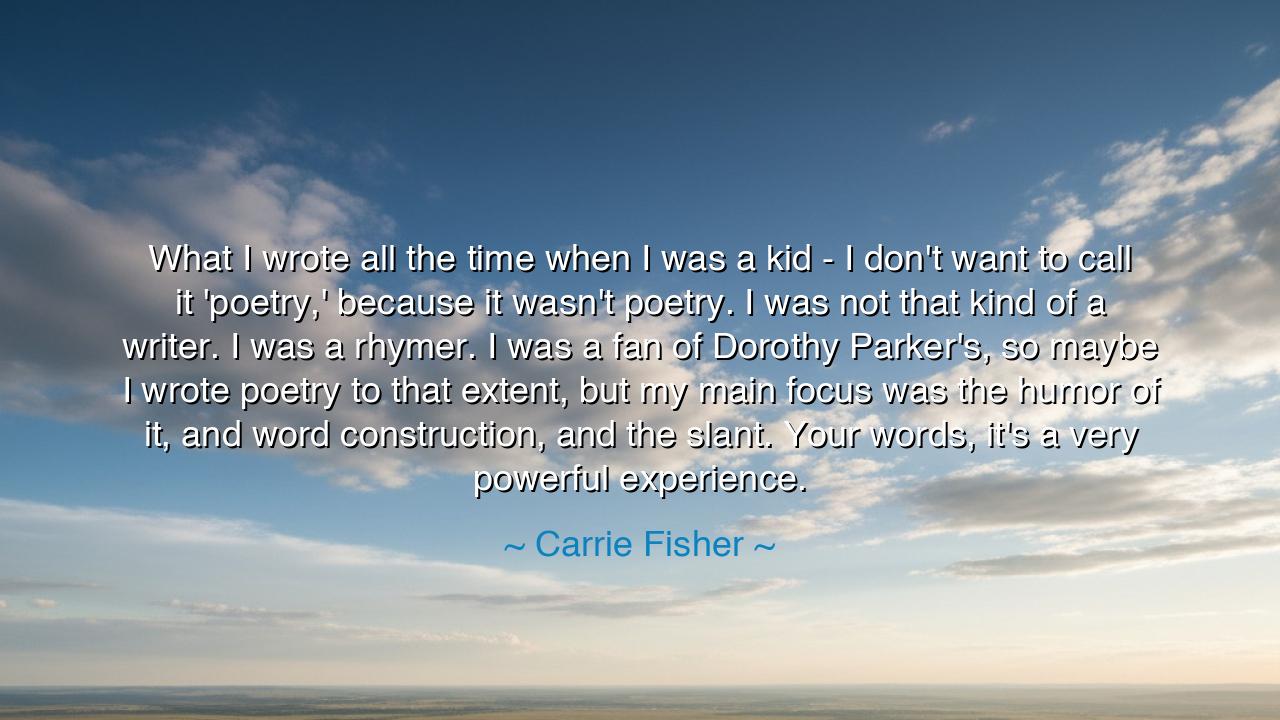
What I wrote all the time when I was a kid - I don't want to call
What I wrote all the time when I was a kid - I don't want to call it 'poetry,' because it wasn't poetry. I was not that kind of a writer. I was a rhymer. I was a fan of Dorothy Parker's, so maybe I wrote poetry to that extent, but my main focus was the humor of it, and word construction, and the slant. Your words, it's a very powerful experience.






In the luminous and self-revealing words of Carrie Fisher, we find both humility and truth: “What I wrote all the time when I was a kid—I don’t want to call it ‘poetry,’ because it wasn’t poetry. I was not that kind of a writer. I was a rhymer. I was a fan of Dorothy Parker’s, so maybe I wrote poetry to that extent, but my main focus was the humor of it, and word construction, and the slant. Your words, it’s a very powerful experience.” Beneath her modest tone lies a sacred recognition: that language—even when playful—is power. Fisher, who lived between laughter and sorrow, knew that words could wound, heal, enchant, and set the soul free. What she calls “rhyme” is in truth the first stirring of a creative spirit, discovering that through words one may give shape to emotion and bring order to chaos.
From her youth, Carrie Fisher was surrounded by both brilliance and turmoil. The daughter of Hollywood legends, she grew up amidst light and noise, fame and fracture. In such a world, words became her refuge and her rebellion. She followed the wit of Dorothy Parker, that queen of sharpness and satire, who could turn heartbreak into humor and despair into elegance. Like Parker, Fisher found strength in irony—a way to face life’s absurdities without being consumed by them. When she speaks of “word construction” and “the slant,” she is describing what the ancients would call alchemy: the turning of pain into laughter, of weakness into art.
For the ancients, the word was sacred. The poets of Greece called their craft “poiesis,” meaning to make, for they believed that to speak truth through language was to participate in creation itself. The Hebrews called it Logos, the divine Word by which all things were made. So too, when Fisher describes writing as a “very powerful experience,” she touches that eternal current: the realization that language gives form to what the heart cannot contain. Even the act of rhyme, simple though it may seem, is a spell—a binding of thought and rhythm that brings harmony to disorder. In her youthful verses, she was not merely rhyming for pleasure; she was learning the power to transform experience into meaning.
There is a tale of the philosopher Sappho, who once wrote of love so fierce and unspoken that her words became immortal flame. Though her fragments survive only in pieces, they burn still, because they carried not mere sound but soul. Carrie Fisher, too, lived and wrote in fragments—wit scattered through interviews, essays, and scripts—but each carried the same fire: honesty tempered by humor. She understood, as Sappho did, that truth must sometimes be delivered through laughter, for laughter is a shield against despair. The “slant” she speaks of is not deception—it is wisdom. For truth, spoken too plainly, can wound; but turned slightly, shaped with humor, it heals.
In her reflections, Fisher reveals that humor is a vessel for truth. She does not claim the lofty title of “poet,” yet she achieves what the greatest poets do: she captures the tremble of the human heart and renders it bearable through art. By finding humor in darkness, she reclaimed her power. For those who suffer, this is a teaching of survival: to laugh is not to deny pain, but to master it. To write with wit is to wield control over what once controlled you. Thus, when she says, “Your words, it’s a very powerful experience,” she reminds us that self-expression is both shield and sword.
The lesson of her life—and of her words—is clear: Use language as light. When the world overwhelms you, when your heart is full of things that cannot be spoken, write them, shape them, rhyme them if you must. It matters not if you call it poetry or prose, for the act itself is sacred. Through words, you can turn fear into insight, chaos into creation. Fisher shows us that one need not be solemn to be profound; that laughter and wisdom often spring from the same well.
So, my child of the future, remember this: to speak, to write, to play with words is to claim your power. Do not fear imperfection; the ancients did not wait for perfection to sing. Like Carrie Fisher, let your humor guard your heart, and let your honesty give your words strength. Whether you rhyme or muse, jest or grieve, speak your truth “with a slant,” for that is how light enters the cracks of the world. And know this—your words, when born of sincerity, can heal not only you, but all who hear them.






AAdministratorAdministrator
Welcome, honored guests. Please leave a comment, we will respond soon